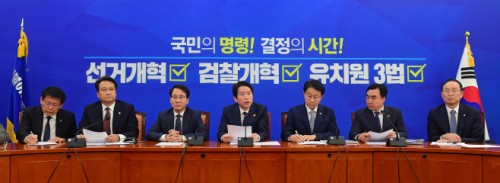 |
| DP floor leader Lee In-young speaks during a policy coordination meeting at the National Assembly on January 15./ Photographed by Song Eui-joo |
By AsiaToday reporter Lim Yoo-jin
South Korea is holding its general elections on April 15, and the political parties are rushing into the general election war by presenting a package of top campaign pledges. On Wednesday, each political party put forth their number one campaign pledge to take their victory.
The ruling Democratic Party (DP) presented the ‘free Wi-Fi expansion’ as its number one pledge in order to garner support form young and socially vulnerable voters. The DP plans to set up 53,000 public access points nationwide by 2022 to offer public Wi-Fi service in the country’s transportation facilities, schools, museums, traditional markets and more. The free Wi-Fi policy, one of President Moon Jae-in’s presidential election pledges, has been chosen as the DP’s top campaign pledge to help households save on related expenses.
“The use of internet data is greatly increased as we move to the fourth industrial revolution,” said DP chairman Lee Hae-chan. “Our goal is to minimize the people’s burden and the blind spot in data communications so that every citizen enjoys the data economy,” he said.
The main opposition Liberty Korea Party (LKP) presented its top economic pledges focused on strengthening the country’s financial soundness, reforming the labor market, and scrapping the Moon Jae-in administration’s nuclear phase-out policy. The LKP previously presented the abolishment of an independent unit investigating corruption by high-ranking officials as its top campaign pledge. However, it decided to respond to the ruling party with the announcement of its economic pledge, and changed its top pledge.
As its number one campaign pledge, the LKP vowed to push for a bill aimed to strengthen the country’s fiscal soundness, and abolish the government’s nuclear phase-out policy by resuming planned construction of the Shin Hanul 3-4 nuclear reactors and operations of existing ones in order to provide the people with relatively cheap electricity. In responding to the transition to the Fourth Industrial Revolution, the LKP will carry out labor market reforms to diversify employment, such as introducing laws on employment contracts.
“We need to change the economic paradigm from regulations and bureaucracy to freedom and fairness,” LKP Chair Hwang Kyo-ahn said. “We will announce policies one by one that improve people’s livelihoods.”
#pledge #general election #DP #LKP
Copyright by Asiatoday
Most Read
-
1
-
2
-
3
-
4
-
5
-
6
-
7





















